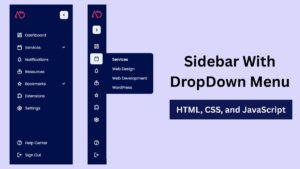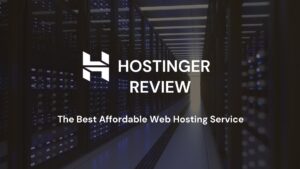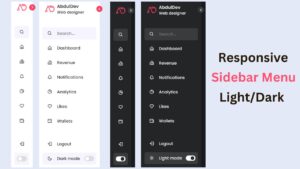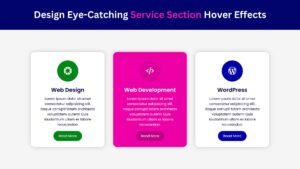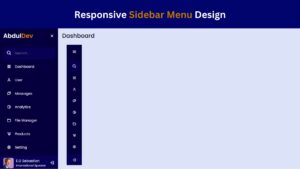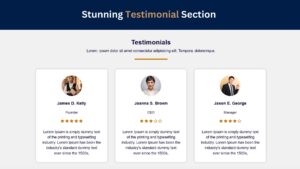
Top 9 WordPress Speed Optimization Plugins to Improve Your Website
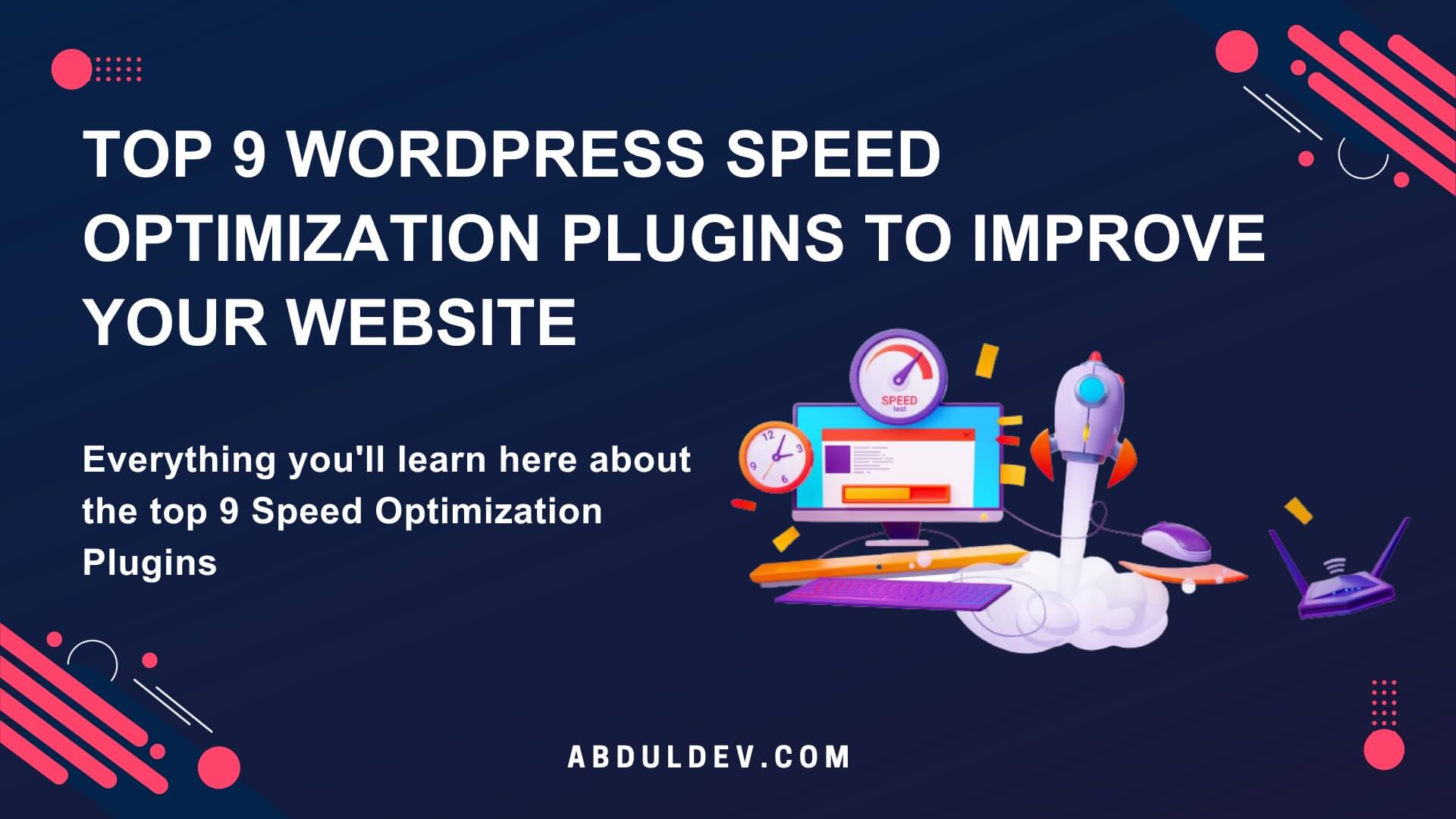
A fast-loading website is essential for better user experience, improved SEO rankings, and higher conversions. With WordPress, optimizing your site’s speed is easy, thanks to numerous plugins designed to enhance performance. In this article, we’ll explore the top 9 WordPress speed optimization plugins and how they can help you achieve lightning-fast load times.
What is Website Speed Optimization?
Website speed optimization is making your website faster and more efficient. This includes reducing load time, optimizing file size, and improving overall performance. By optimizing your website for speed, you can enhance user experience, lower bounce rates, and improve your website’s search engine rankings.
In short, website speed optimization is about making your website run more efficiently and quickly to provide visitors with the best possible user experience. Using the proper performance plugins and techniques ensures that your website loads quickly and easily, no matter what device your visitors use.
Why is Speed Optimization Important for Your WordPress Website?
Speed optimization is a crucial aspect of maintaining a successful WordPress website. With increasing competition, keeping your website running at optimal speed is imperative to ensure an exceptional user experience.
Firstly, slow website speed negatively affects user experience and engagement. Users will likely leave your website if it takes more than a few seconds to load. This results in higher bounce rates, lower conversion rates, and lost potential revenue.
Additionally, Google’s algorithm considers website speed when ranking pages on its search engine results pages (SERPs). Therefore, faster-loading websites have a higher chance of ranking than their slower counterparts. Implementing techniques such as Lazy Load Images, Separate Files, and Image Compression can improve website speed significantly.
Lazy Load Image allows the loading of only the images the user is viewing, reducing the load time of unnecessary images. Separating files such as CSS, JavaScript, and HTML improves website speed by allowing these files to be loaded asynchronously. Finally, image compression helps reduce the file size of images, improving load times without sacrificing image quality.
Optimizing website speed through plugins and other techniques is vital to improving user experience and engagement, increasing the chances of ranking higher on Google’s SERPs, and maximizing potential revenue.
Top 9 WordPress Speed Optimization Plugins: You Need to Know
WP Rocket – A premium plugin that optimizes website speed with just a few clicks without requiring technical knowledge.
W3 Total Cache – One of the most popular free plugins for caching and optimizing website speed.
WP Fastest Cache – A lightweight and user-friendly plugin that improves website speed through caching and minifying CSS and JS files.
Smush – An image compression plugin that optimizes images on your website without compromising quality.
Autoptimize – A free plugin that optimizes website speed by combining and minifying HTML, CSS, and JS files.
WP Super Minify – A plugin that reduces website loading time by compressing and minifying CSS and JS files.
Jetpack – A plugin that offers a range of optimization tools, including site speed and performance.
WP-Optimize – A database optimization plugin that optimizes your WordPress database and removes unwanted data.
Lazy Load – A plugin that optimizes website speed by loading images only when visible on the screen.
Each of these plugins can significantly improve your website speed. The key is identifying the factors affecting your website’s speed and using the plugins that address those issues. Before diving into plugins, it’s essential to understand what factors affect website speed and the basic steps you can take to improve it.
WP Rocket

WP Rocket is one of WordPress’s most popular and highly-rated speed optimization plugins. It’s a paid plugin, but its advanced features and ease of use make it worthwhile for many website owners.
Pricing Plan: WP Rocket has a few different pricing options, depending on the number of websites you’d like to use it on. Their pricing starts at $49 for a single website and goes up to $249 for unlimited websites.
PROS and CONS:
- WP Rocket has a user-friendly interface makes it easy to set up and optimize your website’s speed without any coding knowledge.
- It’s packed with advanced features like database optimization, lazy loading, and cache preloading that can dramatically improve website speed.
- WP Rocket offers excellent customer support with a knowledgeable team that can help with any issues you might encounter.
- The plugin is pricier than competitors, especially if you need to use it on multiple websites.
- Some users have reported compatibility issues with other plugins or themes, making integrating into your website more challenging.
Overall, WP Rocket is an excellent option for anyone looking for an easy-to-use and comprehensive speed optimization plugin for their WordPress website. While it may be more expensive than some other options, the advanced features and excellent customer support make it a worthwhile investment.
W3 Total Cache

W3 Total Cache is one of the most popular caching plugins for WordPress. It’s free and has many features to help speed up your website. Big companies like Mashable, AT&T, and Yoast trust it.
Pricing Plan: The plugin is free in the WordPress repository, but a premium version is also available. The premium version costs $99 per year and includes extra features like fragment caching, lazy loading, and support for Genesis Framework.
PROS and CONS:
- One of the biggest pros of W3 Total Cache is its wide range of features.
- It can handle many types of caching, including page, object, and database caching.
- This plugin can also integrate with CDNs and has options for minifying HTML, CSS, and JavaScript files.
- W3 Total Cache is its easy integration with popular WordPress hosting providers like WP Engine and Cloudways.
- Despite its popularity, some users find W3 Total Cache needs to be simpler to set up and configure.
- Understanding all the options and settings available may take some time and effort.
- Some users report compatibility issues with other plugins or themes.
Overall, W3 Total Cache is a powerful and comprehensive caching plugin that can help improve your website speed. Its many features and integration options make it an excellent choice for beginners and advanced users.
WP Fastest Cache
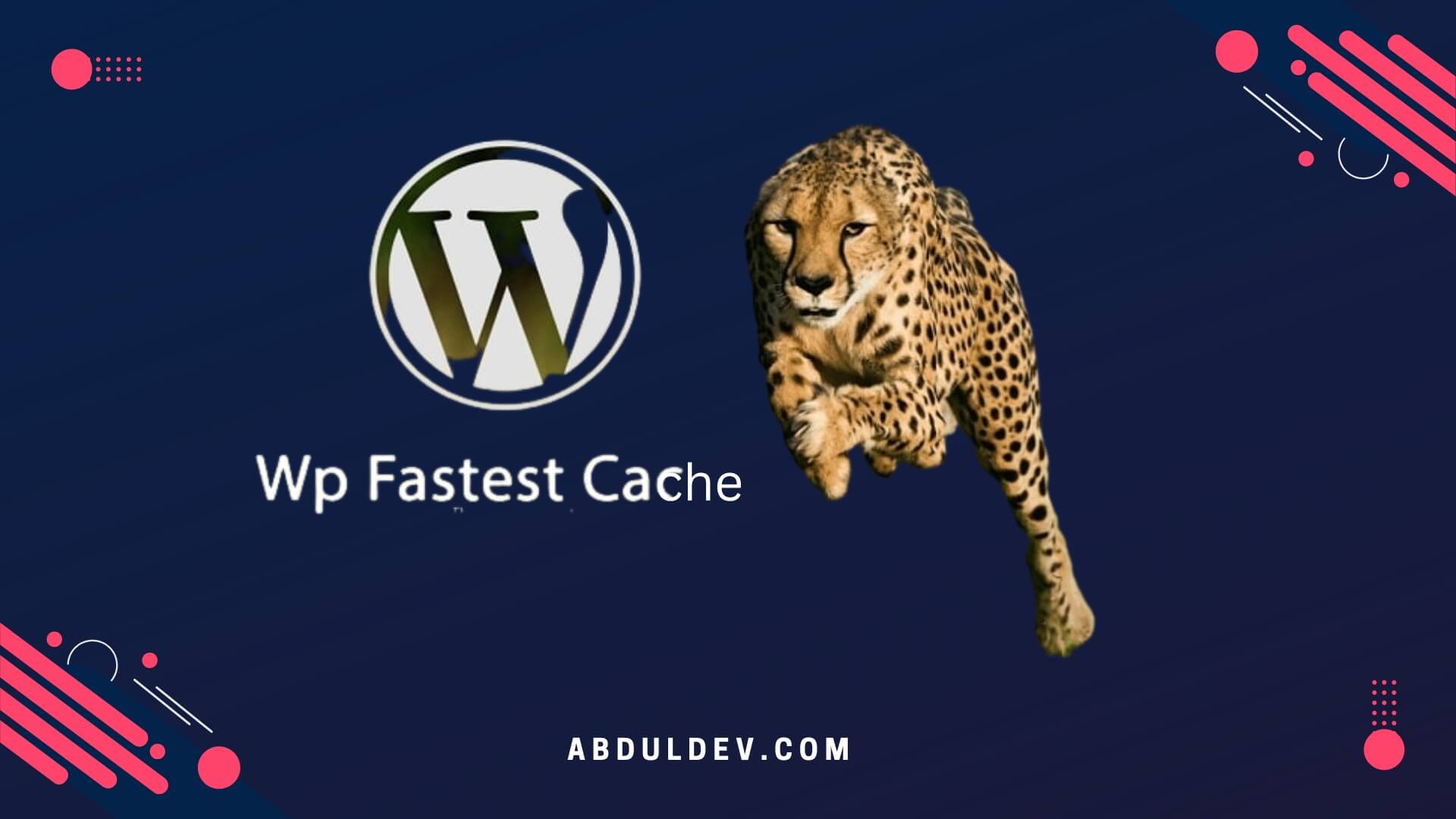
WP Fastest Cache is one of the best WordPress speed optimization plugins available. This plugin is famous for its easy-to-use interface and effectiveness in improving website loading speed.
Pricing Plan: WP Fastest Cache offers both free and premium plans. The free version has basic features, while the premium version includes advanced features and customer support. The excellent plan costs $49.99/year for a single website and $99.99/year for unlimited websites.
PROS and CONS:
- Simple and easy-to-use interface
- Effective in improving website speed
- Support for both desktop and mobile devices
- Option to minify HTML, CSS, and JavaScript files
- Opportunity to combine CSS and JavaScript files for faster loading
- Some advanced features are only available in the premium version
- Limited opportunities for caching and optimization compared to other plugins
- Support may not be as responsive as other premium plugins
Overall, WP Fastest Cache is an excellent option for website owners looking for a simple and effective way to optimize their website speed. This plugin is worth considering with its affordable pricing and ease of use.
Smush

Smush is a popular WordPress speed optimization plugin that optimizes and compresses images without affecting their quality. This plugin optimizes images by removing unnecessary data and compressing them to reduce their file size, which improves your website’s loading speed. Smush offers a free and a pro version, so you can choose the plan that best suits your needs.
Pricing Plan: Smush has a free version with basic features, while the Pro version offers advanced features like Smush CDN, next-gen image formats, and bulk image optimization. The Pro version offers two pricing plans; monthly billing, which costs $19.99/month, and annual billing, which costs $9.99/month (billed annually).
PROS and CONS:
- Smush optimizes images automatically.
- The plugin offers bulk image optimization for up to 50 images simultaneously, saving time.
- Smush offers a CDN to optimize images globally, improving your website’s loading speed.
- It compresses images without reducing their quality.
- The plugin works with all WordPress themes and plugins.
- The free version has limited features, so you may need to upgrade to the pro version to access advanced features.
- The pro version is expensive compared to other image optimization plugins.
- Smush may slow down your website if you optimize only a few images simultaneously.
Overall, Smush is an excellent plugin for optimizing and compressing images on your WordPress website. If you have a lot of pictures on your website, it’s worth considering upgrading to the Pro version to access advanced features like Smush CDN and bulk image optimization. However, the free version may suit your needs if you have a small website with a limited budget.
Autoptimize
Autoptimize is a popular plugin that optimizes your WordPress website by combining and compressing your HTML, CSS, and JavaScript files. This results in a significant improvement in your website speed and can also help improve your website’s performance on search engines.
Pricing Plan: Autoptimize is entirely free to use.
PROS and CONS:
- It has a simple and easy-to-use interface allows users to optimize their website with just a few clicks.
- Autoptimize has several advanced options that allow users to optimize specific parts of their website, such as images and scripts.
- The plugin works well with other caching plugins and does not cause conflicts.
- While the plugin is easy to use, the advanced options may need to be clarified for beginners.
- Some users have reported that Autoptimize can cause specific themes and plugin issues, which may require troubleshooting.
- In some cases, the plugin may be unable to optimize all files, resulting in incomplete optimization.
Overall, Autoptimize is an excellent plugin that can help optimize your WordPress website’s speed. Its advanced options and ease of use make it a perfect choice for beginners and advanced users. Plus, since it’s free, it’s worth trying to see how much of an improvement it can make on your website’s speed.
WP Super Minify
WP Super Minify is a free WordPress plugin that helps to optimize your website speed by combining and minifying JavaScript and CSS files. It helps to reduce the number of requests made to your server by combining files and removing unnecessary white spaces, thus making your website faster and more efficient.
Pricing Plan: WP Super Minify is free and offers no premium plans.
PROS and CONS:
- It is a simple, easy-to-use plugin that significantly reduces website load times.
- The plugin provides an option to exclude specific files from minification and concatenation, which gives you more control over the optimization process.
- WP Super Minify is compatible with most caching plugins and works well with other optimization plugins.
- WP Super Minify offers fewer features than other plugins on this list.
- Some users have reported compatibility issues with specific themes and plugins.
- Since the plugin does not have a premium plan, no customer support is available for users who encounter issues with the plugin.
Overall, WP Super Minify is a good option for website owners looking for a simple and free way to optimize their website speed. However, if you need more advanced features and support, consider one of the other plugins on this list.
Jetpack
Jetpack is a versatile WordPress plugin with multiple features, including speed optimization tools. It is a popular choice among WordPress users due to its broad range of features and its seamless integration with the WordPress platform.
Pricing Plan: Jetpack has multiple pricing plans depending on your desired features. The primary goal is free, offering basic speed optimization tools and essential elements such as site stats, security, and backups. The Personal plan costs $4 per month and includes additional speed optimization features such as Lazy Loading images, which helps to reduce page load time. The Premium and Professional plans offer more advanced speed optimization tools and additional features such as video hosting and monetization tools.
PROS and CONS:
- Offers multiple features beyond speed optimization, including security, backups, and site stats.
- Comes with a free plan with essential speed optimization tools.
- Lazy Loading of images is included in the Personal plan.
- Integrates seamlessly with the WordPress platform.
- Pricing plans can get expensive for advanced features.
- Not all features are available in the free plan.
- Some users have reported conflicts with other plugins.
- Support can be limited for users on lower-pricing plans.
Jetpack is a versatile and reliable choice for those looking to optimize their WordPress website’s speed. With its extensive features and seamless integration with WordPress, it’s worth considering for anyone looking to enhance their website’s performance. However, there may be better fits for users on a tight budget or those with more complex website needs.
WP-Optimize
WP-Optimize is another plugin designed to clean up and optimize your WordPress database. With over 800,000 active installations, WP-Optimize is one of the most popular WordPress optimization plugins.
Pricing Plan: WP-Optimize has a free version with several optimization features. However, you must upgrade to the Premium version if you want more advanced features, such as scheduled automatic clean-ups and priority support. The pricing for WP-Optimize starts at $49 per year for a single site license.
PROS and CONS:
- Easy-to-use interface for both beginner and advanced users
- includes features for database cleaning, image compression, and caching
- Provides scheduled automatic clean-ups to keep your site running smoothly
- Excellent customer support for premium users
- The free version has limited features compared to other plugins
- Some users have reported compatibility issues with specific WordPress themes and plugins
- The premium version is relatively expensive compared to other optimization plugins.
Overall, WP-Optimize is an excellent plugin to improve your WordPress website’s performance and speed. The paid version does come with a price tag, but the advanced features make it well worth it for those who need a more comprehensive solution.
Lazy Load
Lazy Load is a plugin that helps your website load faster by only loading images and other media files when they become visible to the user. This means images below the fold or at the bottom of the page will be loaded once the user scrolls down to view them. Lazy Load is an essential plugin if you have a lot of images on your website, as it speeds up your website by reducing the number of requests and the amount of data that needs to be transferred.
Pricing Plan:
- Free Plan: Enjoy basic lazy loading functionality for a limited number of images.
- Basic Plan: Upgrade to the Basic plan for $9.99/month, offering advanced lazy loading features for small websites.Pro Plan: Get the Pro plan for $19.99/month, unlocking additional optimization options and priority customer support.
- Business Plan: Scale up with the Business plan at $49.99/month, suitable for larger websites and e-commerce platforms.
- Enterprise Plan: Contact us for a custom quote on the Enterprise plan, tailored to meet the needs of enterprise-level websites.
- Agency Plan: Manage multiple client websites with the Agency plan at $99.99/month, including white-label options and bulk discounts.
- One-Time Purchase: Pay $199.99 for a lifetime license, providing unlimited access to the Lazy Load plugin.
PROS and CONS:
- Reduces website loading time and improves website speed.
- Saves bandwidth by only loading media files that are necessary.
- Helps improve user experience by only showing relevant content.
- We need to work correctly with some themes and plugins.
Lazy Load is a great option to consider if you’re looking for a plugin that can speed up your website and improve the overall user experience. Its ability to only load images when they become visible to the user makes it an essential tool for optimizing their website’s performance. Whether you choose to go with the free version or upgrade to the paid version, you will be satisfied with the results.
Factors That Affect Website Speed
Website speed is affected by several factors, and it’s essential to understand them to optimize your website speed. Here are some of the main factors that impact website speed:
- Hosting: Your website speed depends on the quality of your hosting provider. A low-quality hosting provider can slow down your website speed significantly.
- Images and Videos: Large-sized images and videos take longer to load and can affect your website speed. You can optimize your photos and videos by compressing them or using a content delivery network (CDN) to speed up their loading time.
- Plugins: The more plugins you use on your website, the more it can slow down your website. Therefore, using only the necessary plugins and uninstalling the ones you’re not using is essential.
- Theme: Your website theme also affects its speed. A poorly coded theme can slow down your website. Therefore, choose a piece that is lightweight and well-optimized for speed.
- JavaScript and CSS Files: JavaScript and CSS files are responsible for the design and functionality of your website. However, these files can affect your website speed if not correctly optimized.
- Cache: Caching stores frequently accessed data on the user’s computer. Enabling caching on your website can improve its speed significantly.
Understanding these factors can help you identify the issues affecting your website speed and take the necessary steps to optimize it.
Essential Steps to Improve Website Speed
Now that you understand the importance of website speed optimization and know some of the top plugins available for WordPress websites, it’s time to look at some basic steps you can take to improve your website’s speed. Here are some simple steps to get you started:
- Optimize Your Images: High-resolution images can take up a lot of space on your website and slow down its loading speed. Use an image optimizer plugin like Smush or Lazy Load to reduce the size of your images and improve loading times.
- Minimize HTTP Requests: Whenever a user requests a file from your website, it requires an HTTP request. The more requests there are, the slower your website will load. Minimize HTTP requests by reducing the number of files on your website and using CSS and JS files.
- Enable Browser Caching: Browser caching allows your website to store data on the user’s device, so they can access it faster the next time they visit your site. Use a caching plugin like W3 Total Cache or WP Rocket to enable browser caching on your WordPress website.
- Use a Content Delivery Network (CDN): A CDN helps distribute your website’s content across different servers worldwide so that users can access it quickly in other locations. Cloudflare is a popular CDN option for WordPress websites.
- Optimize Your Website’s Code: Use a code optimization plugin like WP-Optimize to remove unnecessary code and streamline your website’s codebase. This can significantly improve your website’s loading speed.
Following these basic steps can significantly improve your website’s speed and performance. Remember to regularly monitor your website’s loading speed and adjust your optimization strategy as needed to ensure that your website continues to perform at its best.
Understanding the Metrics of Website Speed
Before diving into the various speed optimization plugins, it’s essential to understand the metrics used to measure website speed. Here are a few of the critical metrics to keep in mind:
- Load Time – This is the time it takes for your website to load fully, from the moment a user clicks on the link to the point where they can see and interact with the page’s content.
- First Contentful Paint (FCP) – FCP measures the time it takes for your website’s first piece of content to load, such as text or an image.
- Time to Interactive (TTI) – TTI is when a user interacts with your website entirely. This metric includes things like clickable buttons, links, and forms.
- Page Size – The total size of your web page’s files, including images, videos, scripts, and CSS files, can significantly affect the load time of your website.
- Number of Requests – Every file on your website requires a separate request from the server to load. Reducing the number of requests can significantly speed up your site’s load time.
Understanding these metrics lets you decide which plugins and optimizations to prioritize. For example, if your website has a slow TTI, you should focus on plugins that reduce script loading time, while those with large page sizes may benefit from image optimization plugins.
Improving your website’s speed is essential for providing a positive user experience, reducing bounce rates, and improving SEO rankings. With the right combination of plugins and optimizations, you can achieve lightning-fast load times and keep visitors returning for more.
Conclusion
WordPress speed optimization is vital for enhancing your website’s performance and user satisfaction. Choose from these top plugins based on your specific needs to create a blazing-fast website. A well-optimized site not only boosts your SEO rankings but also keeps your visitors coming back for more.
FAQs
Website speed affects user experience, SEO rankings, and conversion rates. Faster websites retain more visitors and rank higher in search engines.
Yes, poorly coded or excessive plugins can slow down your website. Use only essential and optimized plugins.
While speed optimization plugins can significantly improve your website’s speed, the progress can vary depending on various factors like hosting environment, website size, and content. Implementing other best practices alongside using these plugins for optimal results is essential.
While not mandatory, a speed optimization plugin can significantly improve your website’s performance. These plugins offer advanced optimization techniques and simplify optimization, making it easier for website owners to achieve faster loading times.
Most speed optimization plugins are user-friendly, with easy installation and configuration processes. They often have intuitive interfaces and pre-configured settings for beginners. Some plugins require more advanced settings for optimal performance.
Using various speed optimization plugins simultaneously is generally not recommended, as they can conflict with each other and cause issues on your website. Choosing one well-optimized plugin that suits your needs and provides the necessary features is best.
Most popular speed optimization plugins are consistent with many other WordPress plugins and themes. However, there might be rare cases where conflicts arise due to specific combinations. Testing the compatibility and ensuring proper functionality is always a good idea.
Caching stores a static version of your site, reducing server load and improving speed for repeat visitors.
Share on Social Media
Related Articles

5 Simple Ways to Improve Speed Optimization on Your…
Is your WordPress website running slowly? Discover the best strategies for speed optimization and enhance your site’s loading time.
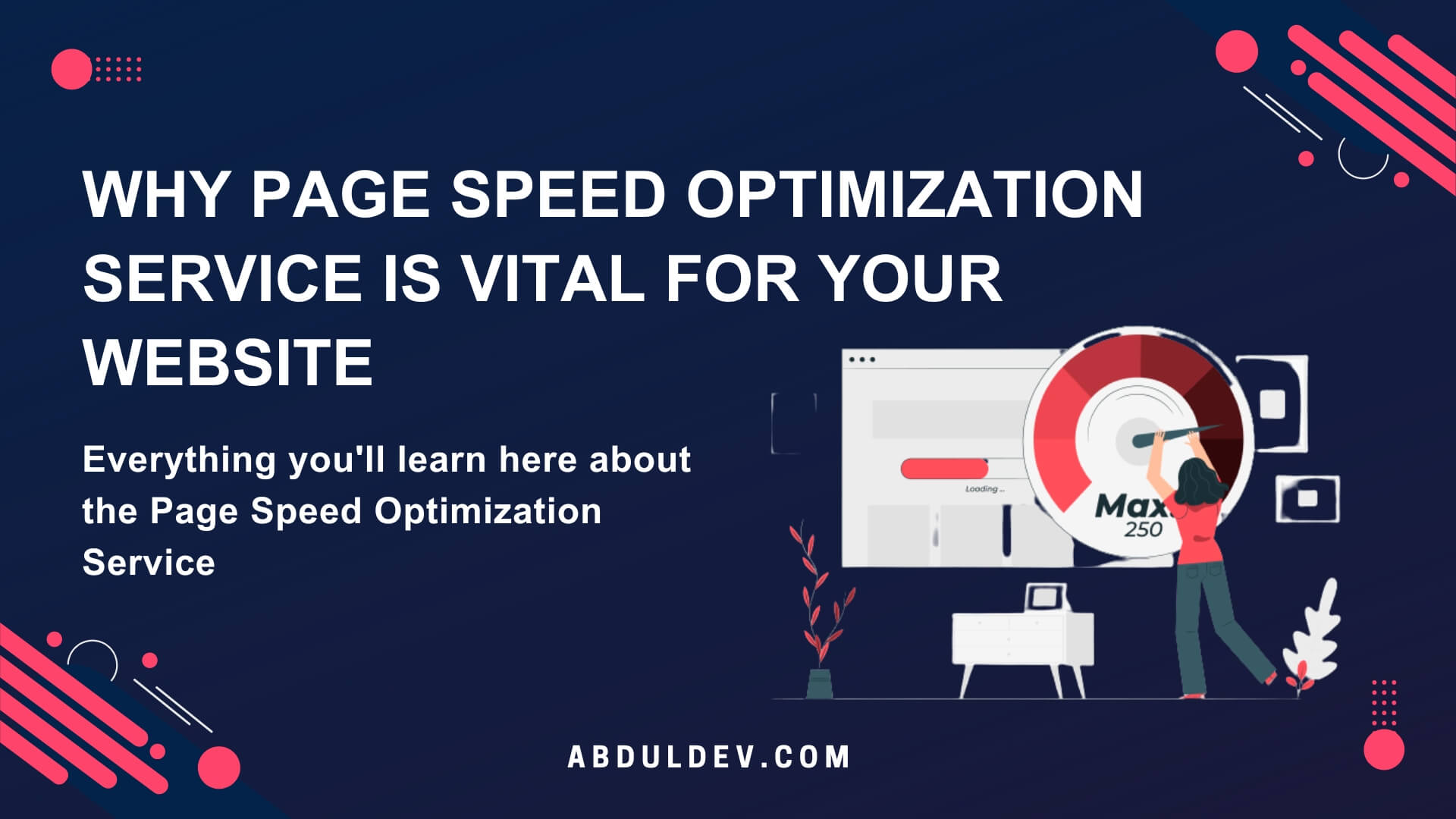
Why Page Speed Optimization Service is Vital for Your Website
Improve your website’s loading time with my page speed optimization service. I am an expert who will analyze and optimize
At AbdulDev, our mission is to support learners and developers by sharing helpful, easy-to-follow tutorials on modern web technologies like HTML, CSS, JavaScript, ReactJS, and PHP.
Useful Links
Copyright© 2025 | abduldev


